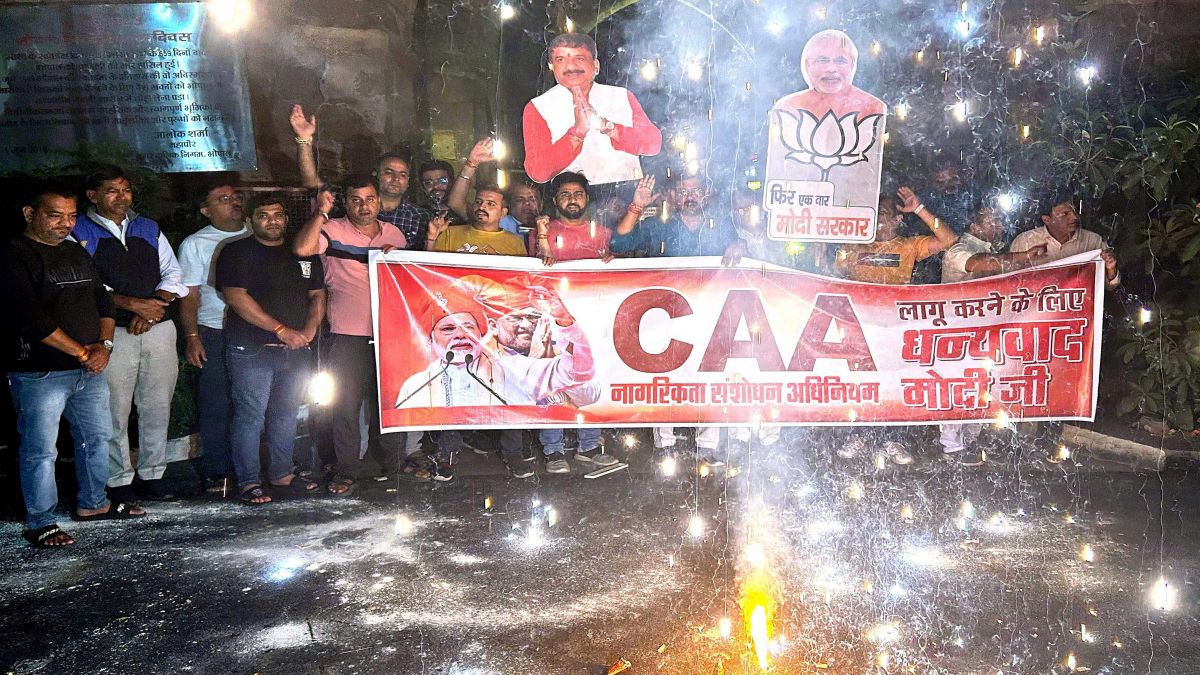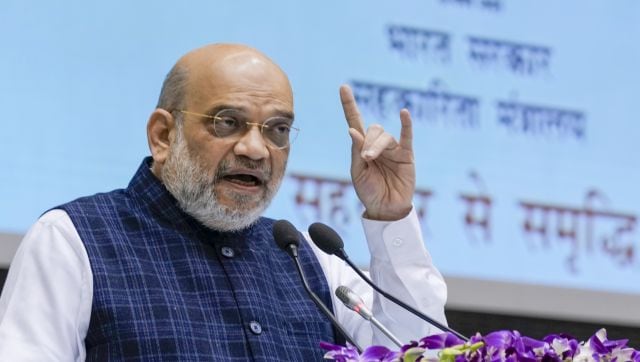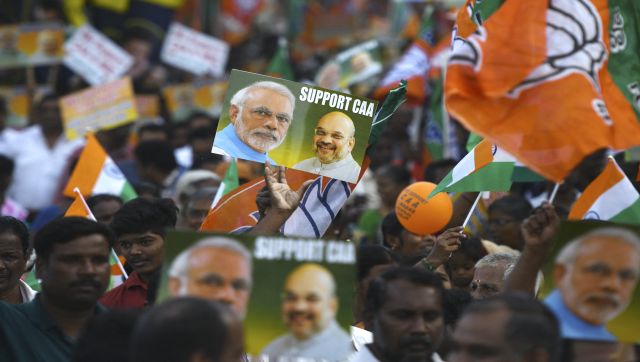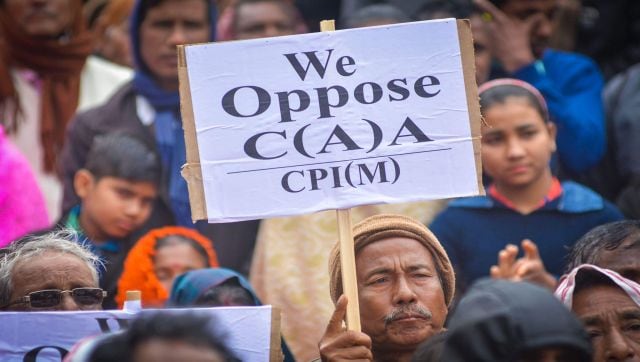)
Four years after it was passed in Parliament, the Citizenship Amendment Act, 2019 (CAA) has been notified. The legislation eases the citizenship process for persecuted non-Muslim migrants from Pakistan, Bangladesh and Afghanistan. The Centre has clarified that the CAA doesn’t change anything for existing Indian citizens read more
Advertisement)
People celebrate after the central government notified the rules for implementation of the Citizenship (Amendment) Act, 2019, in Bhopal on Monday. PTI
Four long years after Parliament passed the Citizenship (Amendment) Act, 2019 (CAA), the Centre on Monday (11 March) notified the rules for its implementation, days before the announcement of the schedule for the Lok Sabha elections.
Following the notification , Union Home Minister Amit Shah said that Prime Minister Narendra Modi has delivered on another commitment and realised the promise of the makers of the Constitution. “With this notification, PM Shri Narendra Modi Ji has delivered on another commitment and realised the promise of the makers of our Constitution to the Hindus, Sikhs, Buddhists, Jains, Parsis and Christians living in those countries,” he wrote on X.
AdvertisementWhile the BJP, its allies and other groups praised the Modi government for CAA, the Congress and other opposition parties criticised the move, alleging it was done to polarise the elections, especially in West Bengal and Assam.
But what exactly is the CAA? What are the rules of the CAA? And what changes with the implementation of the CAA?
What is CAA?
The Citizenship (Amendment) Act, also known as the CAA, aims to protect individuals who have sought refuge in India due to religious persecution. Under the new law, Hindus, Jains, Christians, Sikhs, Buddhists and Parsis coming from Bangladesh, Pakistan and Afghanistan can seek a fast-track to Indian citizenship if they came on or before 31 December 2014.
The law doesn’t cover Muslims with the government explaining that since Pakistan, Afghanistan, and Bangladesh are Islamic republics with a Muslim majority, they cannot be considered persecuted minorities. It also does not cover those fleeing persecution in non-Muslim majority countries, such as the Tamil refugees from Sri Lanka. Moreover, it has no provision for Rohingya Muslim refugees from neighbouring Myanmar.
The legislation was introduced in Parliament in 2019 and soon became the heart of many protests, including the one held at Shaheen Bagh in Delhi. Many had argued that the bill was discriminatory, divisive and a damaging move with purely communal motives. However, in December 2019, the Parliament passed the bill received presidential assent. Earlier, the Ministry of Home Affairs had notified that the Act would come into force on 10 January, 2020. But since the rules were not framed, it couldn’t be implemented.
Advertisement
What are the rules, procedures under CAA?
Now that we have understood what exactly is the CAA, let’s understand the procedure and eligibility.
First off, one must understand that the CAA doesn’t guarantee citizenship but makes it easier for non-Muslim refugees — who entered India on or before 31 December 2014 from the three countries — to get Indian citizenship.
Moreover, most parts of the northeast are exempted from the CAA. The tribal areas of Assam, Meghalaya, Mizoram or Tripura as included in the Sixth Schedule to the Constitution and States of Arunachal Pradesh, Mizoram, Nagaland and Manipur are exempted from provisions of the CAA.
AdvertisementAs per the CAA rules, one will become eligible to apply for Indian citizenship after spending at least 12 months in the country preceding the date of application. Or, the applicant will be eligible to get Indian citizenship if he/she has spent not less than six years in the country out of eight years immediately preceding those 12 months.
Those applying under the CAA will also have to provide an eligibility certificate issued by a locally reputed community institution confirming that he/she belongs to Hindu/Sikh/Buddhist/Jain/Parsi/Christian community and continues to be a member of the above mentioned community.
The applicants will also have to give a declaration that they “irrevocably” renounce the existing citizenship and that they want to make “India as permanent home”, according to the rules.
AdvertisementThe CAA rules also provide separate application for people belonging to these sub-categories — a person of Indian origin, a person who is married to an Indian citizen, minor child of an Indian citizen, a person having Indian parents, a person who or either of his parents was a citizen of independent India, a person who is registered as an Overseas Citizen of India cardholder and a person seeking citizenship by naturalisation.

The rules also state that those applying for citizenship under CAA wont mandatorily have to provide a passport.
A spokesperson for the home ministry said eligible individuals could submit applications in “a completely online mode”. No other documentation will be sought from the applicants, one official said.
AdvertisementOnce the documents are submitted, they will be verified by a District Level Committee headed by Designated Officer, whose details will be specified later.
The designated officer shall also administer to the applicant the oath of allegiance and thereafter, sign the oath and forward the same in electronic form along with confirmation regarding verification of documents to the Empowered Committee.
And when cleared by the Empowered Committee, the applicant will get a “digital certificate” and a hard copy will be provided after a request is made by the applicant.
So, what changes?
The government has clarified and sought to reassure the public that nothing changes for Indian citizens already living in India. In fact, the CAA does not apply to Indian citizens and they are completely unaffected by it.
The home minister also clarified the same, and said that the CAA was being used as a bogeyman by the Opposition, especially West Bengal chief minister Mamata Banerjee.
He reiterated that the CAA is only meant for Hindus, Buddhists, Sikhs, Parsis, Jains or Christians who come from Afghanistan, Pakistan, or Bangladesh and seek citizenship in India after facing religious persecution.
This law is likely to benefit thousands of non-Muslim migrants from the three countries who are as of now living in India either illegally or on long-term visas.

What does the Opposition say?
West Bengal chief minister Mamata Banerjee has been a vocal critic of the CAA, and shortly after it was notified, she said she would fiercely oppose it if she found it to be discriminatory against groups of people living in India and if it curtailed their existing citizenship rights in any manner.
She questioned the timing of the notification, saying, “Why do this only days before the Lok Sabha polls are scheduled to be announced? Why did the Centre have to wait for four years to notify the law after it was passed in Parliament?”
The TMC supremo further added that she was apprehensive that the CAA could be used as a possible precursor to implementing NRC across the nation.
The Congress also slammed the government’s step with Jairam Ramesh alleging that the announcement was yet another attempt to “manage the headlines” after the Supreme Court’s strictures on Monday on the electoral bonds issue. “After seeking nine extensions for the notification of the rules, the timing right before the elections is evidently designed to polarise the elections, especially in West Bengal and Assam,” he said.
Kerala’s Pinaray Vijayan described the CAA as a communally divisive law and asserted that it will not be implemented in the southern state, while the Delhi chief minister Arvind Kejriwal alleged that the Centre’s move is against the country and that it was “dirty politics” of the BJP to make poor people from neighbouring countries its vote bank in India.
With inputs from agencies